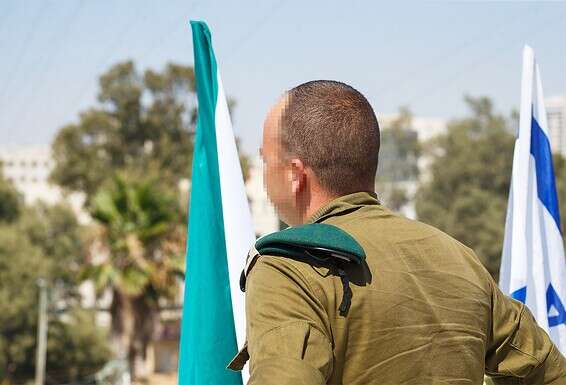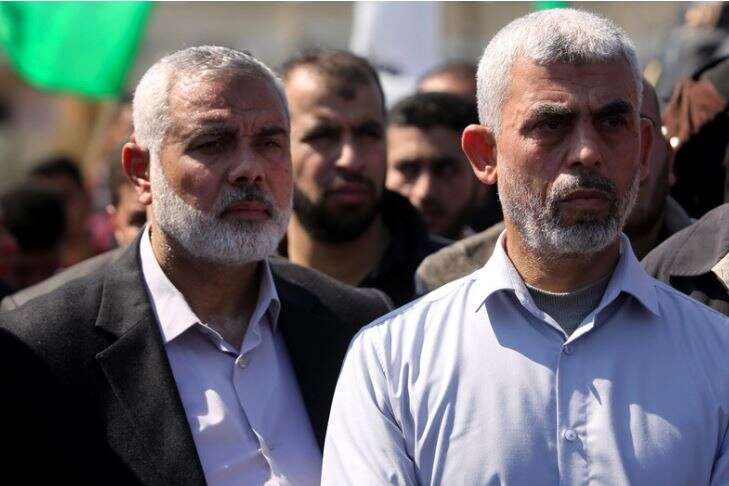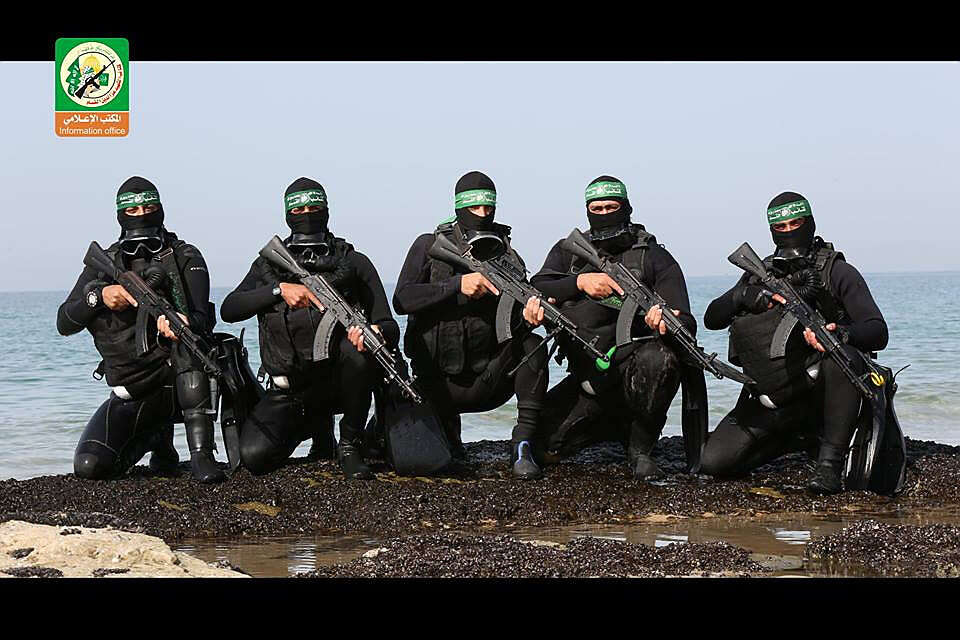"Hamas is not interested in a confrontation with Israel. It is deterred. What concerns it more is the economic situation in the Gaza Strip," says Col. Amit, the Intelligence Officer of the Southern Command, in a special interview with Israel Hayom.
Amit is considered the top authority in the IDF on Gaza and Palestinian issues, and will soon be appointed head of the Research Department in the IDF Directorate of Military Intelligence – the foremost professional intelligence authority in Israel on understanding the country's enemies and their intentions.
"The governing component in Hamas is getting stronger," he says. "From the start, Hamas had two identities – a religious resistance organization and a national movement. Since 2007, it has also taken on an identity as the sovereign power in Gaza, and it is being assessed as such on a daily basis. The main factor that determines the reality of Hamas is the economy. It's the first thing that both the leaders and the public wake up to, and the last thing they go to sleep with."
Follow Israel Hayom on Facebook and Twitter
Amit believes it is incorrect to measure the Gazan economy with the same standards we are familiar with, since it is not like any other in the world. Gaza is used to poverty, but its current situation is more difficult than ever. 60 percent unemployment, especially among young people, and even those who work aren't getting fully paid. "You get half a payslip or a third, and most of it comes from the bloated apparatuses, where almost every family in Gaza is financially supported by some kind of international aid group."

Q: How does that manifest?
"For example, the rise in the age that people are getting married. In the past, people got married young. Today there are people in their 30s who are not yet married. It happens because they can't buy a flat or leave home. We also see drug use and prostitution. These are things that tear the social fabric, and they concern the leadership a lot."
As opposed to other totalitarian leaders in the Arab world, Hamas leadership actually doesn't ignore its people. "Hamas military leader in Gaza Yahya Sinwar grew up in a refugee camp in Khan Yunis and Hamas leader Ismail Haniyeh grew up in the Shati refugee camp. It concerns them. So when they were suffering economically – they signaled to us by using violence."
To surprise, paralyze, and embarrass
These signals have evolved with time. Hamas understood that going from calm to firing rockets on Israeli cities damaged it because it can harm the efforts to reach understandings and a long–term ceasefire, so it invented the signaling system: from violent events on the border fence, through fire and incendiary balloons and nightly noise making to hurt the routines of Israeli residents near the Strip. "It does everything with a long–term ceasefire in mind, because it has no other solution. There is no other actor who can pour money into Gaza."
Q: What does it want?
"One needs to distinguish. Ideologically, it has not changed. It still does not want the State of Israel to exist. If you connect it to a polygraph and ask it if it thinks Israel will one day be destroyed, it will answer 'yes' and it will be telling the truth. But there is no urgency for it for that to happen immediately. For now, it wants a significant improvement in Gaza's situation."
Q: What's it willing to give in return?
"Quiet."
Q: Complete quiet?
"Like what it's giving now and even more."
Q: We still see rocket fire from Gaza sometimes.
"Hamas can't guarantee quiet 100 percent. But the fact is that since May 2019 it didn't initiate any firing on us. It's deterred. Its interest is to break the siege on Gaza."
Hamas, he says, has a very clear pyramid structure. At its base is the organization's ideology. Above that is the issue of building up the military strength of the organization. Above that is the project of the Palestinian state in Gaza, and the top-level is the use of force. Hamas is willing to play with the use of force, and to some extent also with the project of the state. But amassing power and its ideology are off-limits.
That means we can reach a short–term ceasefire but not a long-term one, because at the base of the long-term ceasefire is the equation of rebuilding Gaza in return for demilitarization.
"We'll live on this spectrum between understandings and quiet, attacks and build up, but if I use the terms popular these days – I don't think it's possible to 'flatten the curve.'"
Despite the difficult economic situation in Gaza, Hamas continues to invest huge sums in military build-up. Mainly in rockets, but Amit believes it will begin searching for ways to bypass the new subterranean barrier built around the Strip. It understands that it cannot be on a military par with Israel, so it wants to disrupt life here: to instill fear, to create awareness.

"It doesn't count deaths. Of course, it wants to kill as many of us as it can, but for them the fact that Operation Protective Edge lasted 50 days is an achievement."
Gaza is one place that has coped with the coronavirus pandemic successfully. Hamas is aware of the dire situation of the medical services in Gaza, and understood that the way to avoid catastrophe is to lock it down completely. That means forced isolation of three weeks for whoever enters Gaza, and strict daily rules. "Hamas is a serious organization. They closed everything. Every guideline of our Health Ministry was enforced over there."
The pandemic, he believes, creates opportunity. Hamas is under more pressure and understands that a confrontation with Israel could be dangerous for it.
"We have shared interests. First of all, the desire for living conditions in Gaza to be better than today. We need it to have something to lose. This is something that we have today in our toolbox. When I do a sit–rep, I also speak about the economy. It allows me to act against them without having to worry about firing on the south."
Q: What would make Hamas end the lull?
"First of all, the economy. As long it feels there is progress – projects, international money – it will bite its lip. But if it feels there is no progress or that it's being fooled, it will signal."
Amit believes Hamas is not particularly interested in Israel's plan to extend sovereignty to parts of Judea and Samaria and the Jordan Valley. It won't make them end the quiet in Gaza. They will try to attack using their terror infrastructure in Judea and Samaria, and they especially see it as an opportunity to topple the Oslo framework and the Palestinian Authority.
Q: If annexation happens, they won't respond at all?
"They will wait to see what exactly we'll do, and they wait to see how Palestinians in Judea and Samaria react. If it sees Judea and Samaria go out to the streets, they'll want to be there, too. But from Gaza they'll probably try to act below the threshold of escalation."
Q: Which means?
"[Incindiary] balloons, riots on the fence, maybe allow other organizations to fire."
That's the reason Hamas stopped the demonstrations on the fence on Fridays. The group feared a dynamic that would lead to loss of control, and escalation it's not interested in right now. "On the one hand these protests showed its power: the success of bringing people to the fence every week is impressive. On the other hand, it doesn't want to get into trouble: even when it was ready to pay a price of casualties, the Islamic Jihad came and responded."
One must remember that "as long as Hamas thinks there's a chance for a long–term ceasefire, it's interested in keeping the quiet. Meanwhile, it survives, and as long as it survives it's fine."
Sinwar, he says, makes the calls in Gaza. In the early days of Hamas there was no difference between the religious, political, and military leadership: Hamas founder Ahmed Yassin made all the decisions. After he and his close entourage were eliminated, the organization was divided into political and military wings.
"Sinwar reunited the roles. He has no problem using force and coming to a long–term ceasefire. According to him, that's how negotiations are held, just like he learned in jail: if you're not strong, you're not in a position to negotiate."
Q: Is Hamas archterrorist Mohammed Deif still active?
"We really like these figures like Deif, but one must understand that Hamas today is much less dependent on one man. It's a "terrorist army."
Q: Define "terrorist army."
"A formation that combines terrorism goals with military capability. It no longer acts in closed cells. It's an army that wakes up in the morning, trains, it has a work schedule, it builds itself, and it has an organized formation of command and control. That's how we treat it today."
Q: Is it a good army?
"When it comes to terrorism armies it's very good, and there's a clear reason for that: it's playing against a good army. For a long time now, it has believed it will win in the end and that Israel will disappear off the map."

Q: Is Hamas deterred by Israel?
"Very much so. With three exclamation points. And I can prove that without any problem. But there is also one thing stronger than deterrence: despair. You can't deter someone who is in despair."
'Islamic Jihad went too far'
The most significant event during Amit's job so far was the targeted assassination last November of the leader of the Islamic Jihad in Gaza, Baha Abu al–Ata. "In this case, there really was one man who was a problem," he says. "The Islamic Jihad usually works by the 'divide and conquer' rule: the military leadership in Damascus talks to everybody, and makes sure that there won't be one person with too much power. But Abu al Ata had too much power which was out of the ordinary in that organization. He did whatever he wanted, didn't listen to anyone."
Q: Has someone filled his shoes?
"Islamic Jihad has gone back to being spread out. They understood they went too far with Hamas and retreated. It was amazing: even when they were hit, Hamas didn't do anything. And it wanted everyone to see it wasn't doing anything."
Q: Why?
"Because it wanted to tell them: This is what it looks like when you walk alone. You want to be heroes? Go on. That message reverberated throughout the whole Strip."
Another central issue on the agenda now is the captured and missing Israelis. Amit believes Hamas is interested in a deal as part of the efforts to reach a long–term ceasefire with Israel, but "it won't back down from its own red lines."
Subscribe to Israel Hayom's daily newsletter and never miss our top stories!
Egypt is playing the main role in mediating between the sides. Hamas has long distanced itself from Egyptian President Abdel Fattah el-Sissi, but its dependence on Egypt and the Rafah crossing has only grown. "Egypt influences the siege on Gaza more than anything else. All they have to do is close the Rafah crossing for two days and they are suffocated."
Egypt, he says, has strengthened its response to another threat that concerns Israel in the southern arena – ISIS operatives in the Sinai desert. "There are still attacks every week in the Sinai. We don't hear about it because the casualties are mainly Egyptian soldiers, and it's not the classic attacks that ISIS is known for."
Q: Should we be worried about ISIS in Sinai?
"Always. I remind you that the smuggling from the Sinai continues all the time, especially drugs, and this is a route that can be used to terror as well."
His main concern was and is Gaza. In his next role, he'll be dealing mostly with Iran and the northern sector, but the Strip will remain a constant focus and headache for potential escalation. His duty, he says, is to make sure that Israel incurs a price from Hamas whenever it hits her, and on the other hand, to not be dragged into escalation it doesn't want.
Q: What should be done with Hamas?
"First of all, frustrate it with defense. Every time it tries to come from the air, sea, the fence, the tunnel – it will fail. Beyond that I want to kill its militiamen because in terrorist armies there is great importance to the number of men you kill. And I of course want to hit its leadership and its capabilities on a scale that will make its recovery take a very long time. I understand that in Gaza we live between pauses, and our interest is that the length of the pause will not be determined by desire, but by capability."
As part of this, he warns, the IDF will find it difficult to be merciful in the next campaign. "A terrorist army uses military capability and frameworks, but he does that in a civilian environment on purpose. It has military infrastructure inside schools and apartments of activists. In every flat in Gaza live at least ten people. We are careful to distinguish between terrorists and civilians and to be precise, but if they shoot rockets on our civilians indiscriminately, we will find it hard to be merciful towards theirs."




